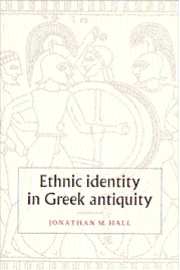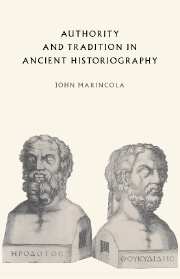Refine search
Actions for selected content:
23990 results in Ancient history
3 - Euripides' “Ion” and the Family Romance of Athenian Racialism
-
- Book:
- Race and Citizen Identity in the Classical Athenian Democracy
- Published online:
- 05 May 2010
- Print publication:
- 15 February 2010, pp 95-136
-
- Chapter
- Export citation
Preface
-
- Book:
- Race and Citizen Identity in the Classical Athenian Democracy
- Published online:
- 05 May 2010
- Print publication:
- 15 February 2010, pp ix-x
-
- Chapter
- Export citation
1 - Theorizing Citizen Identity
-
- Book:
- Race and Citizen Identity in the Classical Athenian Democracy
- Published online:
- 05 May 2010
- Print publication:
- 15 February 2010, pp 1-60
-
- Chapter
- Export citation
Contents
-
- Book:
- Race and Citizen Identity in the Classical Athenian Democracy
- Published online:
- 05 May 2010
- Print publication:
- 15 February 2010, pp v-viii
-
- Chapter
- Export citation
6 - Myths and Realities of Racial Citizenship
-
- Book:
- Race and Citizen Identity in the Classical Athenian Democracy
- Published online:
- 05 May 2010
- Print publication:
- 15 February 2010, pp 240-284
-
- Chapter
- Export citation
Index of Passages Discussed
-
- Book:
- Race and Citizen Identity in the Classical Athenian Democracy
- Published online:
- 05 May 2010
- Print publication:
- 15 February 2010, pp 336-341
-
- Chapter
- Export citation
2 - The Rhetoric of Racial Citizenship
-
- Book:
- Race and Citizen Identity in the Classical Athenian Democracy
- Published online:
- 05 May 2010
- Print publication:
- 15 February 2010, pp 61-94
-
- Chapter
- Export citation
References
-
- Book:
- Race and Citizen Identity in the Classical Athenian Democracy
- Published online:
- 05 May 2010
- Print publication:
- 15 February 2010, pp 289-330
-
- Chapter
- Export citation
5 - Trials of Citizen Identity: Policing and Producing the Racial Frontier
-
- Book:
- Race and Citizen Identity in the Classical Athenian Democracy
- Published online:
- 05 May 2010
- Print publication:
- 15 February 2010, pp 186-239
-
- Chapter
- Export citation
RACE AND CITIZEN IDENTITY IN THE CLASSICAL ATHENIAN DEMOCRACY
-
- Book:
- Race and Citizen Identity in the Classical Athenian Democracy
- Published online:
- 05 May 2010
- Print publication:
- 15 February 2010, pp xiii-xiv
-
- Chapter
- Export citation
4 - Athenian Identity in History and as History
-
- Book:
- Race and Citizen Identity in the Classical Athenian Democracy
- Published online:
- 05 May 2010
- Print publication:
- 15 February 2010, pp 137-185
-
- Chapter
- Export citation

Ethnic Identity in Greek Antiquity
-
- Published online:
- 03 February 2010
- Print publication:
- 10 April 1997

Authority and Tradition in Ancient Historiography
-
- Published online:
- 29 January 2010
- Print publication:
- 24 July 1997
10 - Peace
-
- Book:
- War, Peace, and Alliance in Demosthenes' Athens
- Published online:
- 05 May 2010
- Print publication:
- 28 January 2010, pp 237-264
-
- Chapter
- Export citation
Appendix 3 - Claims of service
-
- Book:
- War, Peace, and Alliance in Demosthenes' Athens
- Published online:
- 05 May 2010
- Print publication:
- 28 January 2010, pp 279-282
-
- Chapter
- Export citation
2 - Economics
-
- Book:
- War, Peace, and Alliance in Demosthenes' Athens
- Published online:
- 05 May 2010
- Print publication:
- 28 January 2010, pp 27-50
-
- Chapter
- Export citation
7 - Calculations of interest
-
- Book:
- War, Peace, and Alliance in Demosthenes' Athens
- Published online:
- 05 May 2010
- Print publication:
- 28 January 2010, pp 154-184
-
- Chapter
- Export citation
References
-
- Book:
- War, Peace, and Alliance in Demosthenes' Athens
- Published online:
- 05 May 2010
- Print publication:
- 28 January 2010, pp 283-308
-
- Chapter
- Export citation
1 - Introduction
-
- Book:
- War, Peace, and Alliance in Demosthenes' Athens
- Published online:
- 05 May 2010
- Print publication:
- 28 January 2010, pp 1-26
-
- Chapter
- Export citation
3 - Militarism
-
- Book:
- War, Peace, and Alliance in Demosthenes' Athens
- Published online:
- 05 May 2010
- Print publication:
- 28 January 2010, pp 51-71
-
- Chapter
- Export citation
